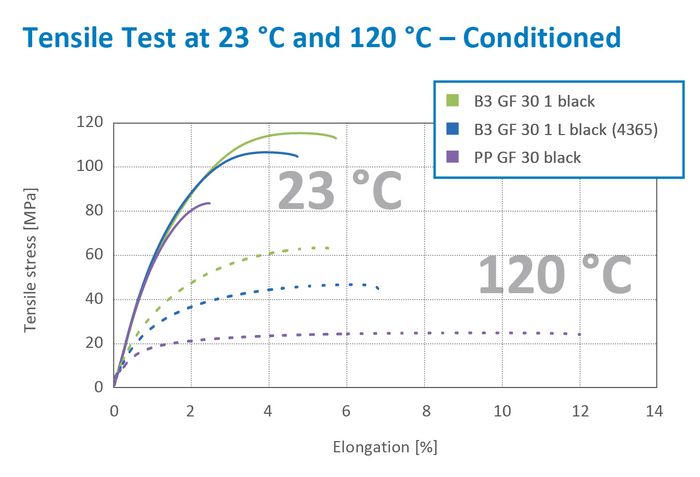Polyamide materials with lower density

Lower-density Polyamide Compounds
For the last 35 years AKRO-PLASTIC GmbH has been a developer and manufacturer of high-quality technical compounds specialising in the field of polyamides. The constant demand for weight reduction has resulted in an increase in use of plastics with a lower density, for example polypropylenes. The automotive sector in particular focuses on low-density plastics in its attempt to reduce fleet consumption and carbon dioxide emissions. The properties of polypropylene alone are inadequate which is why technical thermoplastics, e.g. polyamides are used.
This is why AKRO-PLASTIC has developed AKROMID® Lite a range of compounds with similar properties such as polyamide but with a lower density. AKROMID® Lite bridges the gap between polypropylene and polyamide. In comparison to polypropylene, AKROMID® Lite displays a superior surface quality, enhanced mechanical properties and higher heat resistance. In comparison to PA6 compounds, AKROMID® Lite scores higher in terms of lower density, lower volume price, superior flowability, reduced moisture absorption and enhanced notched impact strength.
AKROMID® Lite
Product Characterisation
Under a practice-related conditioned state, the resistance of AKROMID® Lite compounds is within the range of a standard polyamide compound and above a similar PP compound at room temperatures. At average vehicle interior temperatures of +80 °C, the polyamide products are significantly more resistant than a PP-GF30. For use in the engine compartment, an AKROMID® B3 GF 30 1 L black (4365) is superior to a B3 GF 30 1 black (PA 6/GF 30) with approx. 2/3 resistance and density reduction of approx. 7 % and more constant properties due to the reduced moisture absorption.
To improve the products CO2 footprint we can also offer our new AKROMID® NEXT product line with sustainable alternatives. AKROMID® NEXT B3 GF 30 1 L CR schwarz (8313) contains bio-massed balanced PP and AKROMID® NEXT G3 GF 30 1 L CR schwarz (8314) is made from partly biobased PA 6.9 and bio-massed balanced PP. These products can be officially certified by ISCC PLUS or REDcert².


Image dimensions not found
Change image or reupload it
In conditions extremely similar to the practical environment, the resistance of AKROMID® B3 GF 30 1 L black (4365) is almost at the same level of an AKROMID® B3 GF 30 1 black (2485) and above the average values of PA 6 GF 30 compounds from the competition. The tensile strength of an AKROMID® B3 GF 30 1 L black (4365) is almost the same as that of a competitor PA 6 GF 30 and is considerably above the tensile strength of another competitor PA/PP blend. The superiority of AKROMID® compound properties in comparison to competitor products lies in the special, sensitive compound technology applied by AKRO-PLASTIC GmbH.
Image dimensions not found
Change image or reupload it
The flowability of AKROMID® Lite is higher compared to standard compounds, this is very relevant regarding thin-walled components in particular. Due to the lower pressure requirement during injection, which results from the better flow behavior, the processor also has more freedom on the choice of injection molding machines. Compared to the PA6 GF 30 compounds, an increase in flowability of approx. 50 % can be observed.
Image dimensions not found
Change image or reupload it
Chemical Resistance
The chemical resistance of AKROMID® B3 GF 30 1 L black (4365) is particularly superior to calcium chloride (CaCl₂) and likewise AKROMID® A3 GF 30 1 L black (4436) exhibits better chemical resistance than zinc chloride (ZnCl₂). Among other uses, CaCl₂ is used in road salt to lower the freezing point and as a dust-binding agent. The chemical reaction between zinc parts and salt can form ZnCl₂. Polyamide 6 and 6.6 compounds are aggressively corroded by the materials listed above which, in extreme cases, can severely impair a part’s functioning.
Although AKROMID® B3 GF 30 1 black test specimens exhibit significant damage after immersion in CaCl₂ solution (in accordance with DBL 5416), the tension rods made of AKROMID® B3 GF 30 1 L black (4365) successfully pass the test.
The results of the ZnCl₂ resistance comparison are even more alarming. The state of a standard PA6.6-GF30 deteriorates drastically after just a few hours contact with ZnCl₂ solution. In contrast, AKROMID® A3 GF 30 1 L black (4436) test specimens exhibit no damage even after 200 hrs of exposure to the mechanical load of ZnCl₂ in compliance with the SAE standard J2044.


Applications
Based on the characteristic features and technical properties, the scope of applications can include the following:
Disclaimer: All specifications and information given on this website are based on our current knowledge and experience. A legally binding promise of certain characteristics or suitability for a concrete individual case cannot be derived from this information. The information supplied here is not intended to release processors and users from the responsibility of carrying out their own tests and inspections in each concrete individual case. AKRO®, AKROMID®, AKROLEN®, AKROLOY®, AKROTEK®, ICX®, PRECITE® and DIA(hr)LOG® are registered trademarks of AKRO-PLASTIC GmbH.





